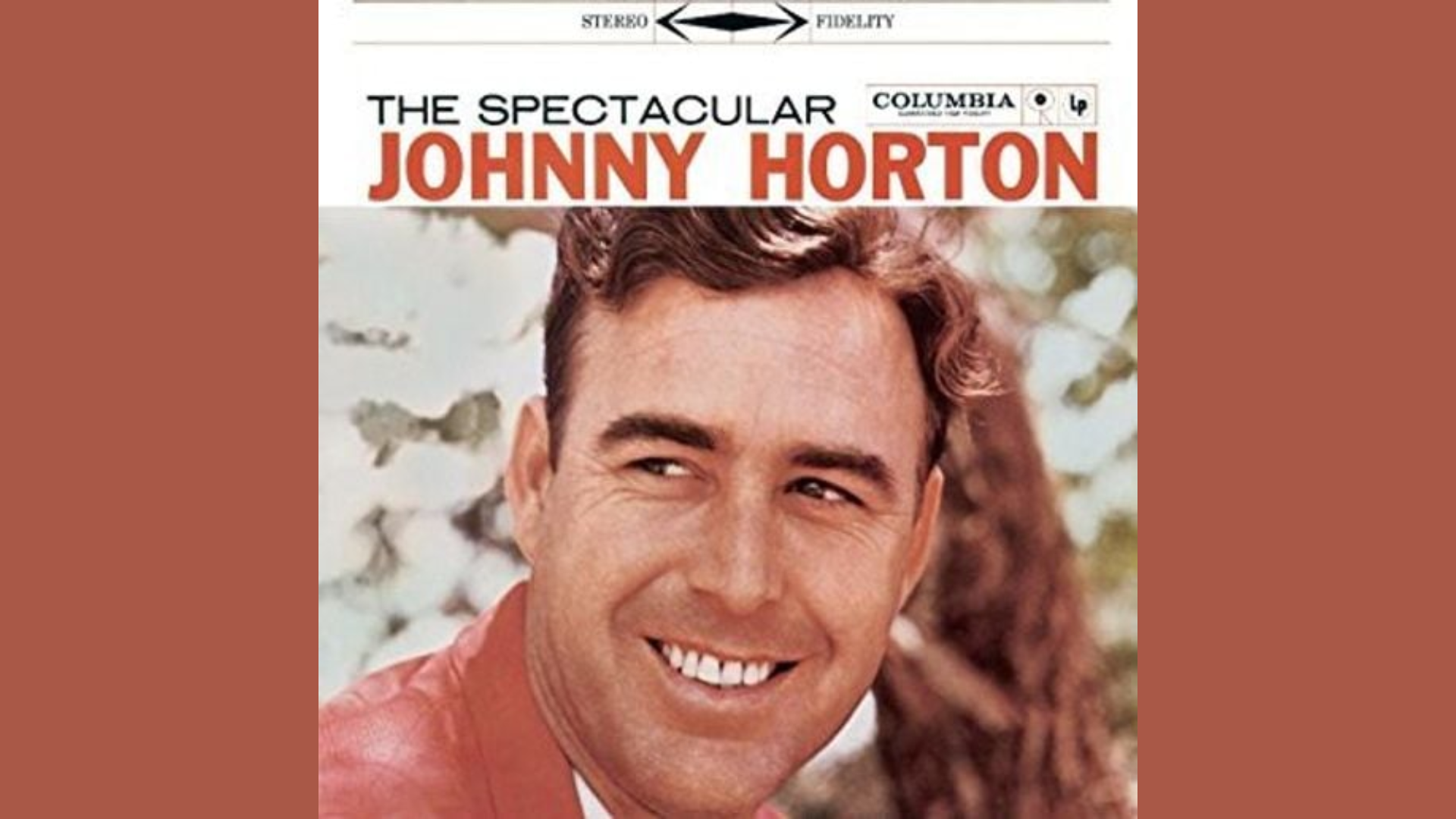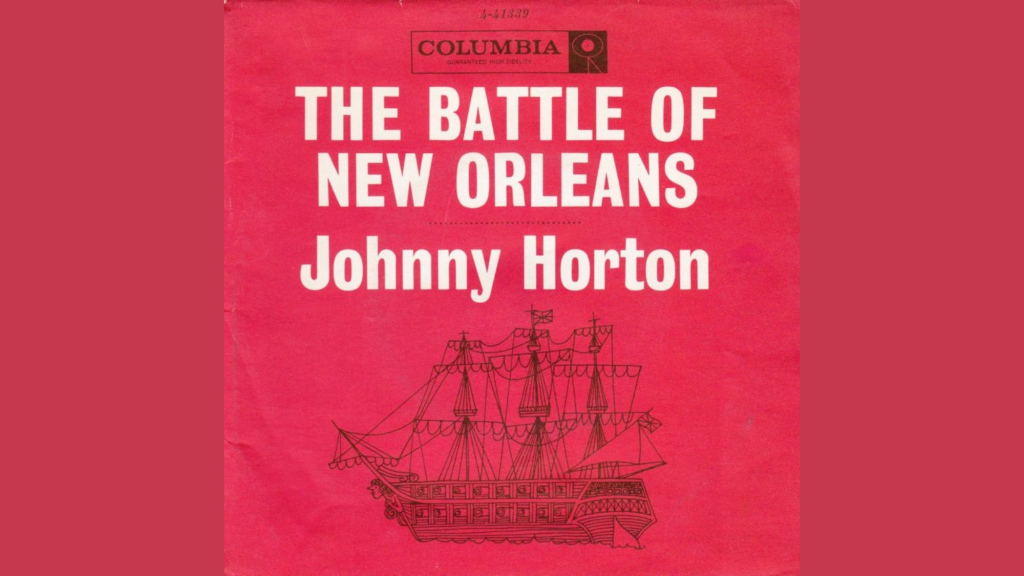Johnny Horton was an American country and rockabilly singer known for his energetic storytelling songs. He became famous in the late 1950s with hits like The Battle of New Orleans and North to Alaska.
His music often told stories from history, which made his songs fun and memorable for listeners. Horton’s clear voice and lively style helped him stand out in both country and pop music.
Sadly, his career was cut short when he died in a car accident in 1960. Even so, Johnny Horton’s songs are still loved today for their catchy tunes and exciting stories.
Other Artists Who Performed The Battle of New Orleans
The Battle of New Orleans has been covered by many artists in different styles over the years. These versions helped the song reach new audiences and kept its lively story alive in country, folk, and pop music.
- Lonnie Donegan
- Pete Seeger
- The Royal Guardsmen
- Doug Kershaw
- Johnny Cash
- Leon Russell
- Ray Stevens
- Deep Purple
- C.W. McCall
- Jimmy Driftwood
About the Song
The Battle of New Orleans is a lively and fun retelling of the 1815 battle where American forces, led by Andrew Jackson, defeated the British.
The song highlights bravery, clever tactics, and the spirit of the American soldiers, using humor and catchy storytelling to make history easy and enjoyable to remember.
| Detail | Information |
|---|---|
| Writer | Jimmy Driftwood |
| Release Date | April 6, 1959 |
| Album | 1956-1960 (1991) |
The Battle of New Orleans Lyrics by Johnny Horton

Verse 1
In 1814 we took a little trip
Along with Colonel Jackson down the mighty Mississip
We took a little bacon and we took a little beans
And we caught the bloody British in a town near New Orleans
Chorus
We fired our guns and the British kept a-comin’
There wasn’t nigh as many as there was a while ago
We fired once more and they began to runnin’
On down the Mississippi to the Gulf of Mexico
Verse 2
We looked down a river and we see’d the British come
(Hut-two three-four)
And there must have been a hundred of ’em beatin’ on the drums
(Hut-two three-four)
They stepped so high and they made their bugles ring
(Hut-two three-four)
We stood beside our cotton bales and didn’t say a thing
(Hut-two three-four)
Chorus
We fired our guns and the British kept a-comin’
There wasn’t nigh as many as there was a while ago
We fired once more and they began to runnin’
On down the Mississippi to the Gulf of Mexico
Verse 3
Old Hickory said we could take ’em by surprise
(One-hut, two-three-four)
If we didn’t fire our muskets ’til we looked ’em in the eye
(One-hut, two-three-four)
We held our fire ’til we see their faces well
(Hut, two-three-four)
Then we opened up our squirrel guns
And really gave ’em – well we
Chorus
Fired our guns and the British kept a-comin’
There wasn’t nigh as many as there was a while ago
We fired once more and they began to runnin’
On down the Mississippi to the Gulf of Mexico
Verse 4
Yeah, they ran through the briars and they ran through the brambles
(One-hup-two, hup-two-three-four)
And they ran through the bushes where a rabbit couldn’t go
(Hup-two, hup-two-three-four)
They ran so fast that the hounds couldn’t catch ’em
(Hup-two, one-two-three-four)
On down the Mississippi to the Gulf of Mexico
(One-two, hup-two-three-four)
Verse 5
We fired our cannon ’til the barrel melted down
So we grabbed an alligator and we fought another round
We filled his head with cannon balls and powdered his behind
And when we touched the powder off the gator lost his mind
Chorus
We fired our guns and the British kept a-comin’
There wasn’t nigh as many as there was a while ago
We fired once more and they began to runnin’
On down the Mississippi to the Gulf of Mexico
Verse 4
Yeah, they ran through the briars and they ran through the brambles
(One-hup-two, hup-two-three-four)
And they ran through the bushes where a rabbit couldn’t go
(Hup-two, hup-two-three-four)
They ran so fast that the hounds couldn’t catch ’em
(Hup-two, one-two-three-four)
On down the Mississippi to the Gulf of Mexico
(One-two, hup-two-three-four)
(Sound off three-four)
(One-two, hup-two-three-four)
(Sound off three-four)
(One-two, hup-two-three-four)
(Sound off three-four)
Similar Songs Like The Battle of New Orleans
These songs share storytelling, catchy tunes, and easy-to-understand lyrics, making them great companions to The Battle of New Orleans.
- North to Alaska: A lively song telling a story about adventure and gold in Alaska, with easy words and a catchy tune.
- Snoopy vs. The Red Baron: It is a fun, playful song about a famous World War I dogfight, mixing humor and history with a strong beat.
- There! I’ve Said It Again: This is a smooth, heartfelt song about love and feelings, sung with gentle emotion and simple words.
- Gamblin’ Man: An upbeat song about the risks of gambling, with clear storytelling and energetic singing that’s easy to enjoy.
Awards for the Song
| Award/Recognition | Year | Category |
|---|---|---|
| Grammy Award | 1959 | Best Country & Western Performance |
| Billboard Hot 100 Ranking | 1959 | Chart Performance |
Similar Songs Like Johnny Horton
You’ll probably like songs that tell exciting stories, use catchy tunes, and have a classic country or western feel.
- Jim Reeves
Genre: Country
Top Album: He’ll Have to Go - Stonewall Jackson
Genre: Country (Honky Tonk)
Top Album: Waterloo - Lefty Frizzell
Genre: Country
Top Album: Listen to Lefty - Hank Snow
Genre: Country
Top Album: The Singing Ranger - Johnny Cash
Genre: Country/Folk
Top Album: At Folsom Prison - Conway Twitty
Genre: Country/Rock & Roll
Top Album: Hello Darlin’ - Ernest Tubb
Genre: Country
Top Album: Walking the Floor Over You - George Jones
Genre: Country
Top Album: The Grand Tour - Buck Owens
Genre: Country/Bluegrass
Top Album: Buck Owens Sings Harlan Howard
Frequently Asked Questions
What is the Main Message of The Battle of New Orleans?
The song celebrates American bravery and victory in a humorous, memorable way.
What Melody is The Battle of New Orleans Based On?
The song uses the melody of The 8th of January, a traditional American fiddle tune named for the date of the battle.
What Made Johnny Horton’s Version of The Battle of New Orleans So Popular?
Johnny Horton’s energetic performance and catchy tune helped the song top the charts in 1959, appealing to both country and pop audiences.





















